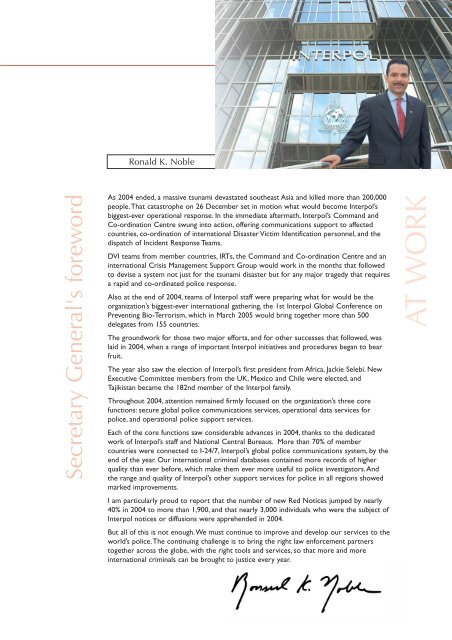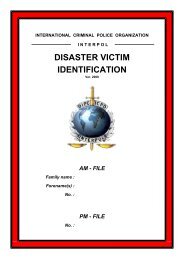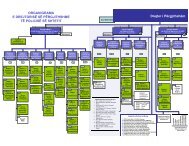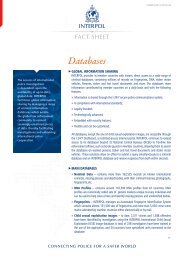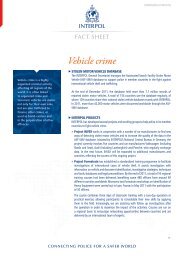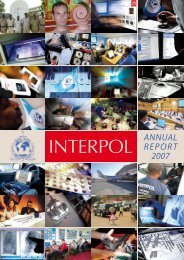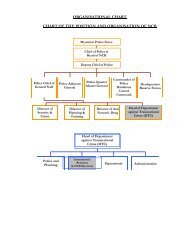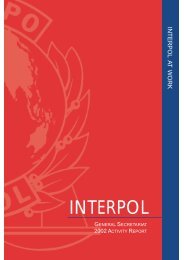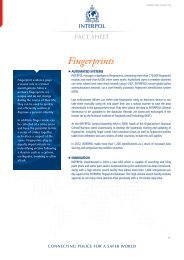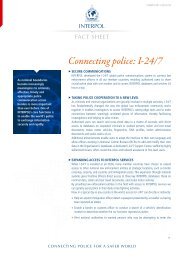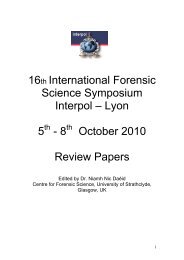2004 - Interpol
2004 - Interpol
2004 - Interpol
Create successful ePaper yourself
Turn your PDF publications into a flip-book with our unique Google optimized e-Paper software.
1<br />
Ronald K. Noble<br />
Secretary General's foreword<br />
As <strong>2004</strong> ended, a massive tsunami devastated southeast Asia and killed more than 200,000<br />
people.That catastrophe on 26 December set in motion what would become <strong>Interpol</strong>’s<br />
biggest-ever operational response. In the immediate aftermath, <strong>Interpol</strong>’s Command and<br />
Co-ordination Centre swung into action, offering communications support to affected<br />
countries, co-ordination of international Disaster Victim Identification personnel, and the<br />
dispatch of Incident Response Teams.<br />
DVI teams from member countries, IRTs, the Command and Co-ordination Centre and an<br />
international Crisis Management Support Group would work in the months that followed<br />
to devise a system not just for the tsunami disaster but for any major tragedy that requires<br />
a rapid and co-ordinated police response.<br />
Also at the end of <strong>2004</strong>, teams of <strong>Interpol</strong> staff were preparing what for would be the<br />
organization’s biggest-ever international gathering, the 1st <strong>Interpol</strong> Global Conference on<br />
Preventing Bio-Terrorism, which in March 2005 would bring together more than 500<br />
delegates from 155 countries.<br />
The groundwork for those two major efforts, and for other successes that followed, was<br />
laid in <strong>2004</strong>, when a range of important <strong>Interpol</strong> initiatives and procedures began to bear<br />
fruit.<br />
The year also saw the election of <strong>Interpol</strong>’s first president from Africa, Jackie Selebi. New<br />
Executive Committee members from the UK, Mexico and Chile were elected, and<br />
Tajikistan became the 182nd member of the <strong>Interpol</strong> family.<br />
Throughout <strong>2004</strong>, attention remained firmly focused on the organization’s three core<br />
functions: secure global police communications services, operational data services for<br />
police, and operational police support services.<br />
Each of the core functions saw considerable advances in <strong>2004</strong>, thanks to the dedicated<br />
work of <strong>Interpol</strong>’s staff and National Central Bureaus. More than 70% of member<br />
countries were connected to I-24/7, <strong>Interpol</strong>’s global police communications system, by the<br />
end of the year. Our international criminal databases contained more records of higher<br />
quality than ever before, which make them ever more useful to police investigators.And<br />
the range and quality of <strong>Interpol</strong>’s other support services for police in all regions showed<br />
marked improvements.<br />
I am particularly proud to report that the number of new Red Notices jumped by nearly<br />
40% in <strong>2004</strong> to more than 1,900, and that nearly 3,000 individuals who were the subject of<br />
<strong>Interpol</strong> notices or diffusions were apprehended in <strong>2004</strong>.<br />
But all of this is not enough.We must continue to improve and develop our services to the<br />
world’s police.The continuing challenge is to bring the right law enforcement partners<br />
together across the globe, with the right tools and services, so that more and more<br />
international criminals can be brought to justice every year.<br />
AT WORK


